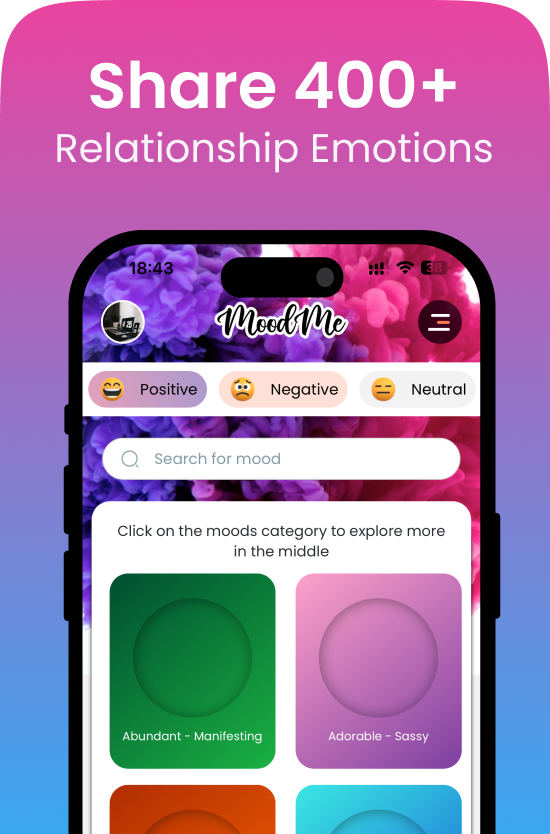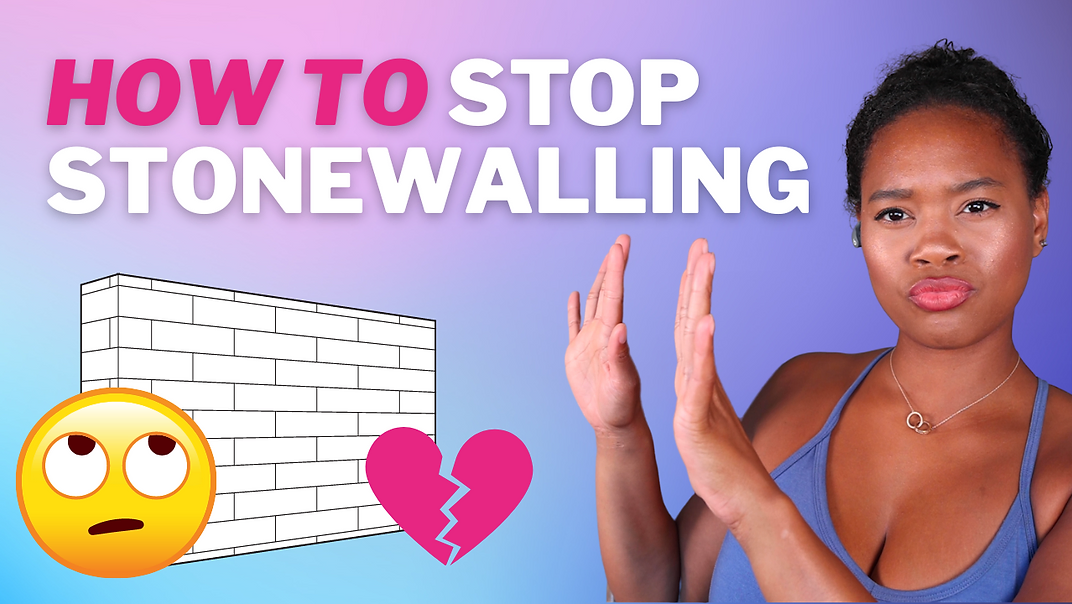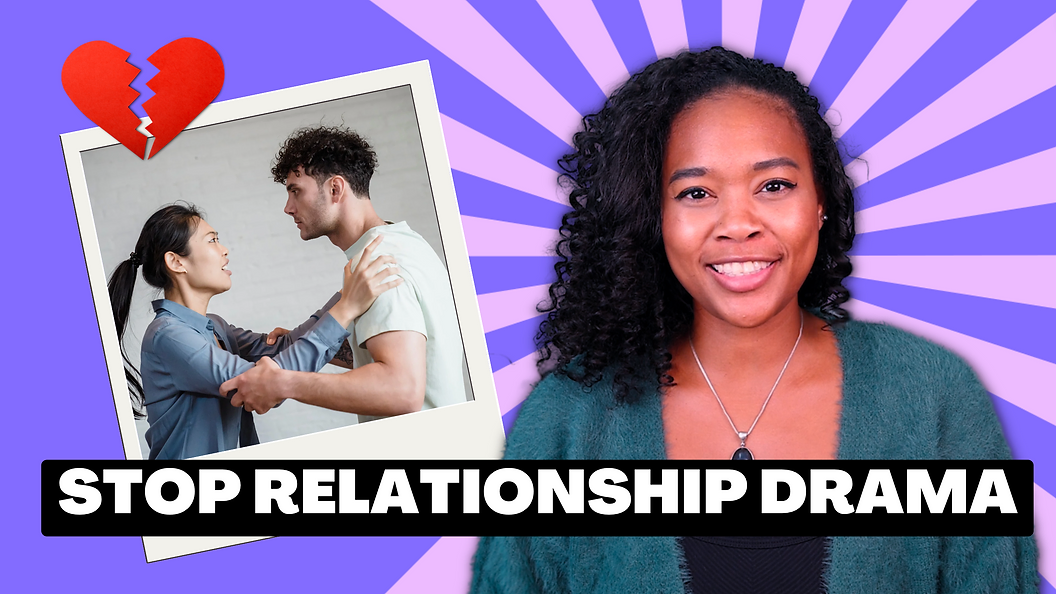Stop being defensive in your relationship!
Have you ever been in a discussion with someone and registered a complaint? Like you didn’t take out the trash like you were supposed to, and then they whip out a piece of paper as long as a CVS rewards receipt and begin reading off all the things you’ve done wrong in the past. On Dec 12, approximately one year ago, you forgot to clean the bathroom. On March 8th, you left a dish in the sink, and on Nov 14th, you blocked the driveway, so I couldn’t get to my parking spot. Defensiveness arises when we feel attacked for a mistake we made, and instead of owning that mistake, we throw up our shield and counterattack the other person or refuse to take ownership of the mistake we made.
You are defensive in conversations if you:
- Stop listening to the other person.
- Make excuses about whatever you are being criticized about.
- Blame the other person for what they are criticizing you about.
- Accuse the other person of doing the same thing.
- Try to justify your actions.
- Bring up past things that the other person did wrong and avoid talking about the current issue.
- Tell the other person they should not feel the way they do.
Defensiveness is a skill that we have learned through evolution. When we feel attacked, our internal alarms go off; our hormones spike our fight-or-flight response. Our tunnel vision turns on as adrenaline is released, and survival is the only thing we can think about. We begin looking at our partners like they are the enemy. And we either need to attack them back or warn them off. Even though our partner isn’t a bloodthirsty bear, we are emotionally vulnerable to them, so it may not feel like our physical livelihood is at stake, but our hearts are.
The issue with this process is defensiveness blocks communication, curiosity, and problem-solving. Because when we are defensive, we aren’t looking for the solution to our partner’s concern; we aren’t even accepting that we may have had something to do with it, quite the opposite. We are denying responsibility and painting our partner as the guilty one. When defensiveness arises, we are saying, sorry you have that issue, but it’s not my fault, and I’m not going to listen to you.
Everyone has been defensive, and this is especially present when relationships are on the rocks. When you feel unjustly accused, you fish for excuses so your partner will back off. But defensiveness is a way of blaming your partner. You’re saying, in effect, “The problem isn’t me; it’s you.”
Defensiveness especially happens when one another hits hard on our behavioral blind spot. Think about when you’re driving and switch lanes, but you can’t see the car directly next to you because it was in your blind spot, so you swerve back over. This is the same concept as our behaviors. Behavioral blind spots that things we can’t see about ourselves but others can see. If your partner were driving behind you, they’d be able to see the car in your blind spot, although you could not. If someone says something about our behavioral blind spot, like hey, I’ve noticed when we are out, you talk over people, and then you react defensively because A) because it would mean that you’re making a mistake and B) because you’ve never noticed it about yourself. When people give us feedback, we often question their motive. What was their intention behind critiquing me? And suppose you’ve been in manipulative and abusive relationships before. In that case, you’re even more likely not to listen when people critique you because it can feel like they’re trying to manipulate, control, or put you down as others did in the past.
Here’s a trick I like to use with my clients and myself. If three people who do not know each other mention the same thing to you. For example, “I feel like you bring up the past a lot in arguments.” Then it’s worth listening because they don’t know each other, and the only common denominator is you. And they might be pointing out a behavioral blind spot. This is good exercise when looking back on past relationships. Have you heard repetitive feedback from your partners? So when/if your current partner brings that same feedback up, instead of being defensive and labeling it as bullshit, take some time to reflect and think about it. Decide whether you want to make some changes. Nothing is more frustrating than being stuck like a broken record. But is it really our partner’s fault? Or are we refusing to accept that we actually have behavioral blind spots?
Here are some alternate reasons why we would behave defensively:
- Our partner has stepped on an insecurity of fear of ours, so we double down and shield up.
- We grew up with overly critical caregivers or were bullied in school, so we had to learn to shield ourselves as a form of protection and haven’t yet learned how to take the shield down.
- We get overwhelmed and flooded with emotion and lack the capacity to communicate non-defensively at the moment.
- We feel ashamed or guilty about the thing our partner is giving feedback about, so we throw a shield over ourselves to try and cover it up.
- We feel our character is being judged, criticized, and attacked, so we are shielding our character from perceived harsh words.
- We watched our caregivers argue in defensive manners and soaked it in like a sponge; thus, we have learned the behavior.
- We don’t know what defensive looks like, so we lack awareness of how to fix it being.
When you become defensive in a conversation with your partner, you react to their words without listening to what they’re saying. So let’s bring awareness to some of the ways that we can be defensive by looking at some examples:
- Refusing responsibility is a defensive shield technique.
- Think about that shaggy song. You had her on the counter, “It wasn’t me; you even had her in the shower, “it wasn’t me,” I even caught you on camera, “it wasn’t me.”
- Alright, real-world example. Feedback “When we were out, you mentioned to everyone that I don’t help enough with the kids.”
- Defensive response. “I didn’t say anything wrong.”
- No matter what your partner argues, you have no responsibility or part in it. It’s your partner’s problem and insecurity, not yours. This also includes gaslighting. Gaslighting happens when people refuse to acknowledge or accept that they did something wrong, so much so that it warps the receiving person’s reality.
- Feedback: You’ve been talking to your ex again; I saw her name pop up.
- I haven’t been talking to her; stop being so insecure.
- Feedback: You gripped my arm hard; there’s a bruise.
- Response: No, I didn’t. You bruise easily.
- Whenever you create excuses rather than owning your part, you are being defensive. Also known as justifying.
- Feedback… You’re 30 min late; you kept me waiting, and you know I don’t like that.
- I had a really busy day, and there was a ton of traffic getting here.
- Feedback: Why didn’t you call me at the end of the night? I was worried about you.
- Response: It was late; I thought you’d be asleep by then.
- When you shift the blame to the other person on the exact thing your partner is complaining about, that is defensive. This is also known as counter-attacking.
- Why did you flirt with that guy?
- Oh, stop; you flirt with girls all day long.
- It scares me when you drive fast like that.
- It scares me when you text and drive.
- You don’t ask me about work anymore.
- You never ask me about work.
- Bringing up the past in arguments is a form of defensiveness.
- We never go out anymore; I wish we could be more social.
- We could be more social if you hadn’t gotten too drunk and embarrassed yourself in front of my friends.
- You name-called me the other day, and I don’t appreciate that.
- Don’t act like you’re an angel when you’ve lied to me before and you wonder why I name-call.
- Yes – butting is a form of defensive behavior.
- We should end our day by being affectionate and cuddling.
- Yes, but you always choose to argue instead.
- I think we should start eating healthy, what do you think?
- Yes, but you like order Door Dash junk every chance you get.
One easy way to fix this in all conversations is to learn the Yes- and technique. We should end our day by being affectionate, yes, and we can watch our favorite show together.
I feel like you’re not being supportive right now. Yes, and I want to learn how I can be a more supportive partner for you.
Defensive behavior doesn’t always come in verbal cues; it can also be physical, such as crossing your arms, rolling your eyes, smirking in an argument, or turning your back when they’re trying to talk to you.
Giving the silent treatment or no response also counts as defensiveness.
Alright, we talked about what defensiveness looks like; let’s talk about how to nix this bad habit.
- Raise your awareness and Pause
- Learn about what it feels like in your body when you become defensive. Is there a fire burning in your chest? Does your throat tighten up? Do you cross your arms? Does it feel like you’re emotionally overwhelmed? What does it feel like in your mind? For me, it feels like a tennis match. My partner hits the ball over, and I hit the ball back. I don’t catch the ball and pause and think about why I have the ball in the first place.
- Going off that example. Once your partner says something to you and therefore tosses you the ball, hold the ball for a second and pause. It’s your turn to receive; it’s your turn to listen. Take some time and breath. Let your adrenaline calm down.
- If the conversation gets too heated, ask for a break and to come back to the conversation at a specific time when you’re more open to hearing them.
- Don’t be afraid to say that you’re in a defensive state and cannot hear them right now.
- Your partner is not your enemy
- Remember that your partner is not your enemy; lay down the sword. You love this person, right? You don’t need to engage in verbal sparring because, in the end, it will hurt both of you. It’s not a war, it’s not a tennis match, and your partner is not your enemy. Don’t fight to be right; fight to understand.
- Take responsibility
- You are not perfect, nobody is, and that’s ok. Our egos want us to be perfect, but perfection is a myth. We make mistakes every day, and the second we can begin to own this, rather than doubling down to protect the ego, life gets so much easier. We don’t have to paint everyone else as the enemy and us as the consistent victim. We will take back control over our lives by taking responsibility for our actions. And even if we don’t logically understand why we hurt our partner, it doesn’t matter. They’re hurt, and we had something to do with it. So, we can use our empathy and empathize with the feeling rather than trying to reason ourselves out of it. Once you can admit that you were wrong and learn to take responsibility, life becomes so much easier. Your relationships will quite literally prosper because people will feel safer being around you instead of a stubborn wall that consistently blames them.
- Be Curious. Ask questions. Get to the underbelly of the conflict
- Underneath every conflict is a chance to grow and better understand your partner. You can do this by asking questions instead of instantly responding. You can do this by being curious.
- Ask
- What emotion is my partner feeling right now?
- What specific event is my partner upset about?
- What positive action step can I take to help my partner?
How your partner talks to you impacts how you feel, but it does not determine how you respond. When you choose to react defensively, you perpetuate the problems in your relationship.
When you seek to understand and empathize with your partner, even if you’re feeling under attack, you pull both of you out of negative cycles.




